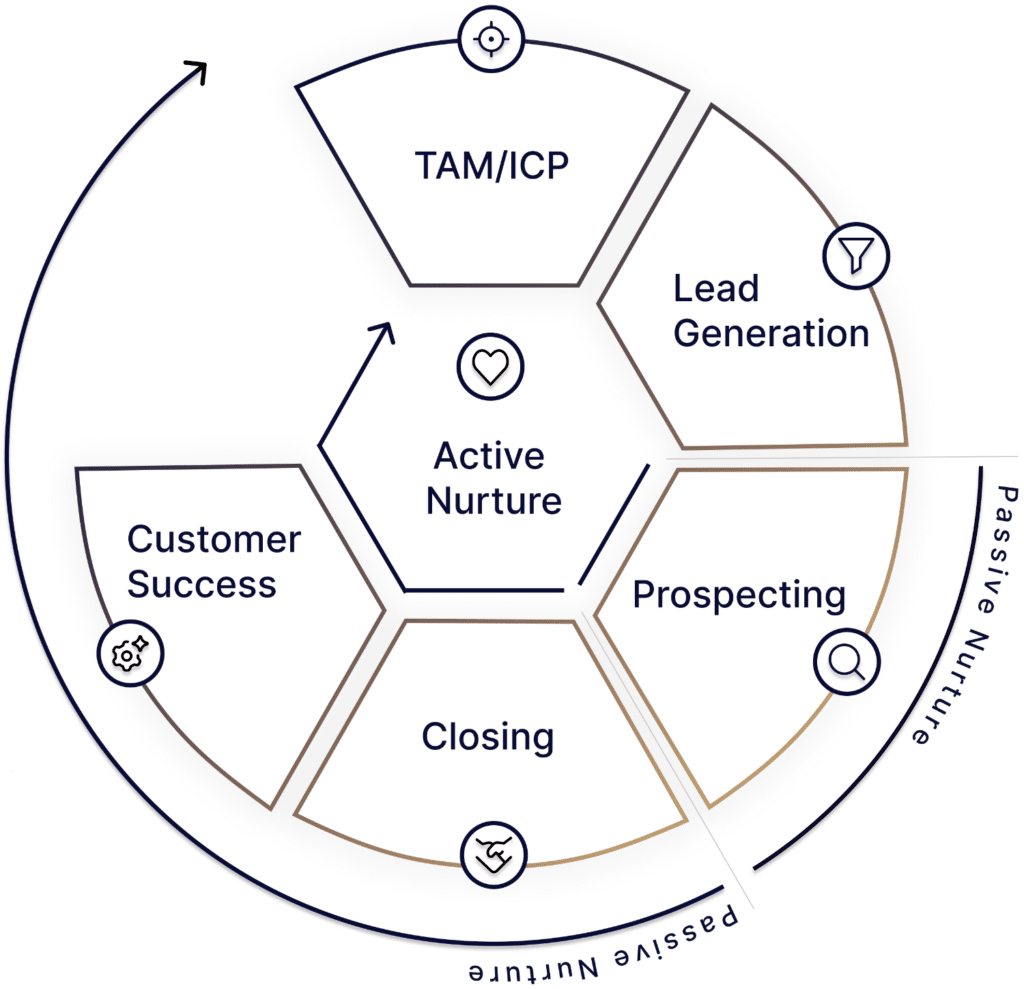Sales Flywheel
Our proprietary process for building sales momentum through continuous customer engagement for sustained growth.
- The Sales Flywheel creates a self-perpetuating cycle of growth.
- Ongoing communication and support ensure higher customer loyalty.
- Standardized processes ensure a consistent customer experience.
The Traditional Sales Method
The traditional sales method is outdated, focusing on a linear process that pushes customers through a one-way journey from awareness to purchase. This approach leaves little room for ongoing engagement and often results in disengaged customers once the sale is complete. In today’s dynamic market, this method falls short, failing to nurture lasting relationships or foster loyalty.
- Almost zero nurturing throughout the sales process.
- Once a sale is closed, the process often ends, and follow-up may be minimal.
- Interaction with customers often decreases after the sale is made.
- Metrics focus on lead quantity and conversion rates.
- Marketing and sales functions may operate independently.
- Limited attention to post-sale engagement and customer satisfaction.
Our Answer: The Sales Flywheel
The Sales Flywheel redefines how businesses engage with their customers. It focuses on continuously attracting, engaging, and delighting them, creating a self-sustaining cycle of growth. By integrating marketing, sales, and customer service, every interaction adds momentum, turning satisfied customers into loyal advocates.
01
Sustainable Growth
By continuously attracting and engaging customers, the flywheel creates a self-perpetuating cycle of growth.02
Improved Relationships
Ongoing communication and support ensure higher customer satisfaction and loyalty.03
Efficiency and Consistency
Standardized processes and the use of technology streamline sales efforts and ensure a consistent customer experience.The Sales Flywheel
-
TAM/ICP
Define your ideal customers are target market. -
Lead Generation
Attract new leads through marketing or outreach. -
Prospecting
Qualify leads to determine their potential. -
Closing
Finalize the sale and convert leads into customers. -
Customer Success
Maintain and grow customer relationships for repeat business. -
Nurture
Actively nurture by putting leads back into the flywheel. Passively nurture through marketing.

Implementation Steps
Implementing the Sales Flywheel can seem daunting, but we’re here to help. Our step-by-step approach ensures a seamless transition from traditional methods to this modern, customer-centric strategy.Step: 01
Define Roles and Responsibilities
Assign specific roles to team members and ensure clarity on responsibilities for each stage of the flywheel.Step: 02
Develop Standard Operating Procedures
Create SOPs for each stage to ensure consistency and efficiency.Step: 03
Implement Technology Solutions
Integrate the necessary tools and platforms to support each stage of the flywheel.Step: 04
Conduct Training Programs
Roll out training modules for all team members to ensure they have the skills and knowledge needed.Step: 05
Measure and Optimize
Continuously track key metrics and optimize processes based on performance data and feedback.Comparing the Sales Flywheel
To understand the evolution of sales strategies, it’s crucial to compare the traditional sales funnel with the modern Sales Flywheel. While the sales funnel focuses on moving leads through a linear path towards a single transaction, the Sales Flywheel emphasizes continuous engagement and long-term customer relationships.| Flywheel Step | Traditional Funnel | Sales Flywheel |
|---|---|---|
| Approach | Focuses on a one-time transaction; linear and ends with the sale. | Focuses on building long-term relationships; cyclical and continuous. |
| Customer Focus | Prioritizes conversion and new customer acquisition. | Prioritizes customer satisfaction, retention, and repeat business. |
| Engagement | Engagement typically decreases after a sale. | Continuous engagement even after the sale. |
| Measurement | How much your company is converting at each stage. | Overall growth, customer lifetime value, and satisfaction. |
| Integration | Often siloed functions (marketing and sales operate independently). | Seamless integration between marketing, sales and CS. |
| Efficiency | Efficiency in moving leads through a linear path. | Efficiency in creating ongoing momentum and leveraging each interaction. |
Send a Message
Contact Us
Drop us a line whenever you’re ready to grow your revenue channels.
Address: 34 13th Ave NE Suite 113a, Minneapolis, MN 55413
Phone: (612) 324-1636
Email: info@thevantomgroup.com
